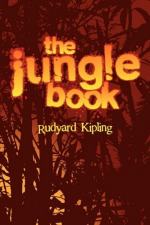Then the grass by the mouth of the hole stopped waving, and Darzee said, “It is all over with Rikki-tikki! We must sing his death song. Valiant Rikki-tikki is dead! For Nagaina will surely kill him underground.”
So he sang a very mournful song that he made up on the spur of the minute, and just as he got to the most touching part, the grass quivered again, and Rikki-tikki, covered with dirt, dragged himself out of the hole leg by leg, licking his whiskers. Darzee stopped with a little shout. Rikki-tikki shook some of the dust out of his fur and sneezed. “It is all over,” he said. “The widow will never come out again.” And the red ants that live between the grass stems heard him, and began to troop down one after another to see if he had spoken the truth.
Rikki-tikki curled himself up in the grass and slept where he was—slept and slept till it was late in the afternoon, for he had done a hard day’s work.
“Now,” he said, when he awoke, “I will go back to the house. Tell the Coppersmith, Darzee, and he will tell the garden that Nagaina is dead.”
The Coppersmith is a bird who makes a noise exactly like the beating of a little hammer on a copper pot; and the reason he is always making it is because he is the town crier to every Indian garden, and tells all the news to everybody who cares to listen. As Rikki-tikki went up the path, he heard his “attention” notes like a tiny dinner gong, and then the steady “Ding-dong-tock! Nag is dead—dong! Nagaina is dead! Ding-dong-tock!” That set all the birds in the garden singing, and the frogs croaking, for Nag and Nagaina used to eat frogs as well as little birds.
When Rikki got to the house, Teddy and Teddy’s mother (she looked very white still, for she had been fainting) and Teddy’s father came out and almost cried over him; and that night he ate all that was given him till he could eat no more, and went to bed on Teddy’s shoulder, where Teddy’s mother saw him when she came to look late at night.
“He saved our lives and Teddy’s life,” she said to her husband. “Just think, he saved all our lives.”
Rikki-tikki woke up with a jump, for the mongooses are light sleepers.
“Oh, it’s you,” said he. “What are you bothering for? All the cobras are dead. And if they weren’t, I’m here.”
Rikki-tikki had a right to be proud of himself. But he did not grow too proud, and he kept that garden as a mongoose should keep it, with tooth and jump and spring and bite, till never a cobra dared show its head inside the walls.
Darzee’s Chant
(Sung in honor of Rikki-tikki-tavi)
Singer and tailor am
I—
Doubled
the joys that I know—
Proud of my lilt to
the sky,
Proud
of the house that I sew—
Over and under, so weave
I my music—so weave I the house that I
sew.




